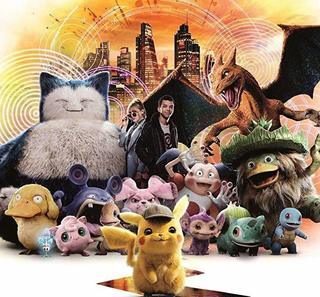How Hollywood is slowly introducing AI to make movies
 The world of movies is full of intriguing “what if”: will Smith, as you know, refused the role of Neo, Nicolas cage got the lead role in” Superman ” Tim Burton, but only he had time to try on a suit, as the film was postponed. Actors and Directors often take on projects that eventually do not come out or are simply filmed by someone else, and fans can only wonder what could come out of it.
The world of movies is full of intriguing “what if”: will Smith, as you know, refused the role of Neo, Nicolas cage got the lead role in” Superman ” Tim Burton, but only he had time to try on a suit, as the film was postponed. Actors and Directors often take on projects that eventually do not come out or are simply filmed by someone else, and fans can only wonder what could come out of it.
Those who produce films, this approach does not suit. If the difference between a successful and a failed film is which actress to take the lead – Gal Gadot or Alicia Vikander-they need to know about it. If a movie that doesn’t succeed in the U.S. is going to make a record box office in Europe, they need to know about it. And now they can help in this artificial intelligence.Los Angeles-based startup Cinelytic is one of the companies promising a wise AI producer. It collects data on how films have been received by the public over the years, then matches them with the subject matter of the pictures and the main cast, using machine learning to identify patterns. The SOFTWARE allows users to assemble a virtual dream team by inputting a script and cast and then watching projected fees change when a single item is replaced.For example, you have the idea of a summer blockbuster starring Emma Watson. And with Cinelytic, you can see how fees will change if you take Jennifer Lawrence instead of Emma. “You can compare them separately, you can together. Make both scenarios for Emma and Jennifer and see which of them will be the best choice for the film in different regions, ” explains the principle of the co-founder and CEO of the service Tobias Queisser (Tobias Queisser).
And it’s not the only company planning to use AI in the film industry. In recent years, these firms have a lot of divorced. Belgian-based ScriptBook, founded in 2015, claims that its algorithms predict the success of a film based on a script. The Israeli Vault, which appeared in the same year, promises that it will tell customers what audience the film will attract, analyzing including trailer views. Another company called Pilot, using similar methods, will predict the collection of the picture 18 months before the release “with unimaginable accuracy”.And even existing companies are pouring into this business. Last November, 20th Century Fox explained how it uses AI to highlight objects and scenes in trailers and understand among which “micro-segments” of the audience the film will be most popular. Judging by Fox’s releases, the method works controversially. For example, on the trailer for “Logan,” released in 2017, the AI gave out the tags “vegetation, “”beard, “”machine” and — the most popular category – “tree.” But according to Kesser, such technologies have long been introduced into the industry.”Robots, drones, cutting-edge technology reign on film sets, but from a business point of view, the industry hasn’t changed in twenty years,” he says. People use Excel and Word, simple business methods. In terms of data, everything is very fragmented and there is almost no analysis.”
Therefore, the main talents of Cinelytic do not come from Hollywood. Kesser himself worked in Finance, a field that used machine learning in everything from high-speed trading on the stock exchange to calculating risk at a credit rate. The company’s co-founder and CTO, Dev sen, also came from a serious technology industry: he had previously developed risk assessment models for NASA. “Decisions worth hundreds of millions of dollars were based on sen’s calculations,” kesser assures, thereby asserting that the film industry can trust Him.Is that so? This is a more complicated question. Cinelytic and other companies contacted by the Verge journalists refused to issue forecasts for any of the upcoming releases, and there is very little scientific data on analysis in this area. Although ScriptBook shared its forecasts for 2017 and 2018, which showed a fairly high-quality work of their algorithm.Of the 50 films, among which were “the First player to prepare”, “Reincarnation”, “a Quiet Place”, only half were commercially successful, and thus the industry was able to predict the fate of the pictures with an accuracy of 44%. Scriptbook algorithms guessed the success of the pictures with an accuracy of 86%. “This is twice as accurate as industry forecasts,” said Michiel Ruelens, a developer and analyst of mathematical models.In 2016, a study was published, claiming that the success of the film can be predicted quite accurately by analyzing simple parameters such as the theme and performers of the main roles. But Kang Zhao, a co-author of the study, cautioned that such an analysis still has drawbacks.
One is that the predictions of algorithms are sometimes too obvious. No need to use expensive AI to understand that Leonardo DiCaprio or Tom cruise in the title role will increase the chances of success of the film.Also, the algorithms are surprisingly conservative: they analyze the data of those pictures that have already come out, and do not take into account future cultural changes in the tastes of viewers. This is the main problem of AI in all industries, and it can lead to so-called AI biases. For example, Amazon abandoned its AI-HR, which did not consider female applicants: according to the results of the analysis, it associated the propensity to engineering fields with men, because they now dominate the market.Zhao also cites another example on the market-released in 2016, “Warcraft”, based on the MMO RPG “World of Warcraft”. Due to the fact that such video adaptations of games are rare, their success is difficult to predict. In the US, the film performed poorly, grossing only $ 24 million in its first weekend. But it became a huge hit in China-it collected a record for a foreign film in the history of the country.And who could have predicted that? Definitely not algorithms.
There are similar stories in ScriptBook forecasts for 2017/2018. So, the AI knew that ” Away!”Jordan Peele will be successful, but he was wrong in the numbers: the algorithm said about 56 million us dollars, and the film collected 176 million. also, the algorithms did not believe in the “Grief-Creator” James Franco, the story of Tommy Wiseau: in their opinion, the film would have collected 10 million us dollars, but in fact received 21 million with a budget of 10 million.”We collect only the data that can be collected,” Zhao said. In order to take into account other nuances (such as the memeticity of the “Room” on which the “Mountain Creator” is based), you still need to take advantage of people.Andrea Scarso, Director of the British Ingenious Group, agrees. His company uses Cinelytic software TO select films to invest in, and according to Scarso, the program is only good as a support item.
“Sometimes it confirms our decisions, and sometimes Vice versa: it offers something that we did not think about in a particular project,” he says. Using AI to develop a film — with replacement actors, budget changes and analysis of how the potential Outlook will change — “opens the door to different points of view,” he said, but is never the final solution.”I don’t think the algorithm has ever changed our minds,” he recalls. — But with it, however, you can see how one or two elements in the same project can seriously affect its commercial success. Cinelytic, together with our analysts, confirms that our projects are not just some wild ideas.”But if all these algorithms are so useful, why aren’t they widely used? Ruben believes that to blame the bright Hollywood trait — shame. People are simply ashamed. In an industry full of charisma, aesthetics and intuition, to rely on cold machine calculation is to admit your failure as a creative person who does not care about the artistic value of the picture.
Clients ScriptBook are “the largest Hollywood studios”, but specific names he, of course, does not call, hiding under the NDA. “People don’t want to be associated with AI, because by and large in the world it is still considered that AI is bad,” he says. “Everyone wants to use it, but they don’t want to admit it.” Similar agreements prevent Kesser from naming Cinelytic’s clients, but they are, he said, “big indie companies.”Some people in the industry deny accusations that Hollywood uses AI to promote potential films, at least at the pitch stage. Alan Shea (Alan Xie), CEO of Pilot Movies, a company that offers Analytics based on machine learning in the film industry, says that he “never talked to a representative of the American Studio, who would believe in AI-analysis of scenarios, and even more so to implement it in your decision-making process.”Shea says studios may just not want to talk about using such SOFTWARE, but also, he says, such algorithms, including script analysis algorithms — are an inaccurate tool. But the amount of media support and marketing costs is a much more reliable factor for determining the success of a film. “We basically developed scenario-based movie box office prediction models, and they were noticeably worse than those based on real-time social media data,” he shared.




